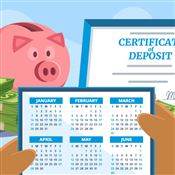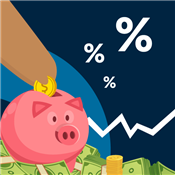Best 3-Month CDs to Maximize Short-Term Savings
Ad Disclosure: This article contains references to products from our partners. We may receive compensation if you apply or shop through links in our content. This compensation may impact how and where products appear on this site. You help support CreditDonkey by using our links.
Make the most of your time and money. Choose the best 3-month CD rates today.
 |
- Western Alliance Bank:
4.30% APY - Always.bank:
4.25% APY - Ponce Bank:
4.25% APY - Freedom Bank:
4.20% APY - SkyOne Federal Credit Union:
4.15% APY - Bank Of Utah:
4.15% APY - Sterling Federal Bank:
3.95% APY
Short on time but looking to grow your savings? If you don't want to lose your money to quick and risky investments, try exploring 3-month CD rates.
CDs can yield good earnings in the short term. And for little to no risk. But getting one might not work for all scenarios. Find out if 3-month CDs would suit your plans.
PRO TIP: Currently, one of the highest rates on a 3-month CD is with Western Alliance Bank at an impressive 4.30% APY. Find out more
3-Month High-Yield CD - 4.30% APY
- No fees
- $1 minimum deposit
- 24/7 online access
- FDIC insured
3-Month High-Yield CD - 4.25% APY
- $1 minimum deposit
- No fees
- 24/7 online access to funds
- FDIC insured
3-Month High-Yield CD - 4.20% APY
- $1 minimum deposit
- No fees
- 24/7 online access to funds
- FDIC insured
3-Month High-Yield CD - 4.15% APY
- $1 minimum deposit
- 24/7 online access
- Federally insured by NCUA
3-Month High-Yield CD - 4.15% APY
- $1 minimum deposit
- No fees
- 24/7 online access to funds
- FDIC insured
3-Month High-Yield CD - 3.95% APY
- No fees
- $1 minimum deposit
- 24/7 online access to funds
- FDIC insured
What is a 3-Month CD?
A 3-month certificate of deposit (CD) is a short-term savings account that holds a fixed amount of money for a fixed 3-month term. In exchange, you get a fixed rate that is usually higher than most regular savings accounts.
But if you close your 3-month CD before it matures, you might need to pay early withdrawal penalties. For short-term CDs, penalties can cost a few months' worth of interest–sometimes even a full term's worth.
How Much Does a 3-month CD Pay?
If you have $25,000 in a 3-month CD with 5% APY, you'd earn $307 at the end of the term (not bad for just 3 months). The higher your APY and deposit, the more interest you earn.
Here's a table to show you what you'd earn on a 3-month CD.
| $10,000 | $25,000 | $50,000 | |
|---|---|---|---|
| 0.00% | $10,000 | $25,000 | $50,000 |
| 0.50% | $10,012 | $25,031 | $50,062 |
| 1.00% | $10,025 | $25,062 | $50,125 |
| 1.50% | $10,037 | $25,093 | $50,186 |
| 2.00% | $10,050 | $25,124 | $50,248 |
| 2.50% | $10,062 | $25,155 | $50,310 |
| 3.00% | $10,074 | $25,185 | $50,371 |
| 3.50% | $10,086 | $25,216 | $50,432 |
| 4.00% | $10,099 | $25,246 | $50,493 |
| 4.50% | $10,111 | $25,277 | $50,553 |
| 5.00% | $10,123 | $25,307 | $50,614 |
| 5.50% | $10,135 | $25,337 | $50,674 |
Check out how much you can earn on CDs with different terms and APY using this CD calculator.
Is a 3-Month CD Worth It?
3-month CDs are good for short-term goals. They are best for those who have a large amount of money to put away for the next few months and want to earn high interest. It's also good if you want to curb spending.
Ultimately, whether a CD is worth it or not depends on your goal. There may be other savings options more suitable for your situation.
A high-yield savings account, for example, might be the better choice if you want easy access to your money.
High-Yield Savings Account - 4.35% APY
- $1 minimum deposit
- No fees
- 24/7 online access to funds
- FDIC insured
If you don't need your money for longer, you can choose a longer term CD to secure your rates for more time.
Here are some of the top CD rates by term:
| Term | Bank and Yield Rate |
|---|---|
| 3 Month | Western Alliance Bank: |
| 6 Month | Generations Bank: |
| 9 Month | Blue Federal Credit Union: |
| 1 Year | First Financial Northwest: |
| 18 Month | American First Credit Union: |
| 2 Year | Always.bank: |
| 3 Year | Generations Bank: |
| 4 Year | SkyOne Federal Credit Union: |
Can I Lose Money on a 3-Month CD?
In general, you won't lose money on a 3-month CD. Funds deposited in a CD are federally insured by the FDIC or NCUA.
Thus, should your bank or credit union fail, you are guaranteed to get your money back up to $250,000.
However, you can lose money when you withdraw your funds pre-maturely. You'll have to pay a penalty which can reduce your earnings and sometimes your principal.
Pros and Cons of a 3-Month CD
Pros:
- Short term commitment
- Higher rates than regular savings account
- Low risk; Deposits are federally insured
- Promotes better spending habits
3-Month High-Yield CD - 4.30% APY
- No fees
- $1 minimum deposit
- 24/7 online access
- FDIC insured
Cons:
- Early withdrawal penalties
- Cannot add more money to your CD
- Missed investment opportunities due to lock-in period
High-Yield Savings Account - 4.35% APY
- $1 minimum deposit
- No fees
- 24/7 online access to funds
- FDIC insured
Typically, you cannot withdraw from your 3-month CD without paying penalties. CDs can give high rates when tying up a fixed amount of money for a specific term. If you need your funds before maturity, check how much the early withdrawal fees will cost first.
How to Choose a 3-Month CD?
If you're set on getting a 3-month CD, here are some factors you can consider when choosing one:
- APY
You'll want to get a good APY for a 3-month CD. Typically, online banks and credit unions offer higher rates than traditional banks. - Minimum deposit requirement
CDs usually require a minimum deposit, ranging from just $1 to over $100,000 for Jumbo CDs. Find a CD that fits your budget. - Early withdrawal penalties
The fees for closing a 3-month CD early can be heavier because of its short timeframe. Some banks may even charge you the full term's worth of interest.
| APY | Minimum Deposit | ||
|---|---|---|---|
| Western Alliance Bank: 3-Month High-Yield CD | 4.30% | $1 | Learn More |
| Always.bank: 3-Month High-Yield CD | 4.25% | $1 | Learn More |
| Ponce Bank: 3-Month High-Yield CD | 4.25% | $1 | Learn More |
| Freedom Bank: 3-Month High-Yield CD | 4.20% | $1 | Learn More |
| SkyOne Federal Credit Union: 3-Month High-Yield CD | 4.15% | $1 | Learn More |
| Bank Of Utah: 3-Month High-Yield CD | 4.15% | $1 | Learn More |
| Sterling Federal Bank: 3-Month High-Yield CD | 3.95% | $1 | Learn More |
Long-term CDs allow you to lock in APYs for a longer time. But if you need quicker access to your funds, short-term CDs can be good. Or you can also check out no-penalty CDs for more flexibility.
Alternatives to 3-Month CDs
A 3-month CD may not be for everyone. Here are other short-term options that you can consider.
High-Yield Savings Accounts
Some online high-yield savings accounts offer competitive interest rates. Plus, you get easy access to your money, unlike CDs.
- NexBank:
4.35% APY - CIT Bank:
$300 Bonus - Discover Bank:
$200 Cash Bonus - Western Alliance Bank:
4.25% APY - UFB Direct:
Earn up to 4.01% APY - Mission Valley Bank:
4.27% APY - First Community Bank:
4.26% APY - DR Bank:
4.25% APY - Paprika Capital Bank:
4.22% APY - Dayspring Bank:
4.17% APY
No-Penalty CDs
If you're not sure about tying up your money, no-penalty CDs let you withdraw before the term ends with no early withdrawal fees. Think of it like a savings account with locked-in returns.
- Sallie Mae Bank:
10-Month No Penalty CD - 4.30% APY - OptimumBank:
5-Month No-Penalty CD - 4.20% APY - Mission Valley Bank:
3-Month No-Penalty CD - 4.15% APY - Ponce Bank:
4 Month No-Penalty CD - 4.15% APY - Technology Credit Union:
5-Month No Penalty CD - 4.00% APY - SkyOne Federal Credit Union:
12-Month No-Penalty CD - 3.90% APY - Freedom Bank:
12-Month No-Penalty CD - 3.75% APY - GreenState Credit Union:
12-Month No Penalty CD - 3.55% APY
Longer CD Terms
Long-term CDs may give higher rates than short-term CDs. And plus, you get to secure your rate and maintain steady returns over a greater duration.
- mph.bank:
60-Month Callable CD - 4.36% APY - Sallie Mae Bank:
10-Month High-Yield CD - 4.35% APY - Generations Bank:
36-Month Callable CD - 4.29% APY - UNCLE Credit Union:
36-Month Callable CD - 4.20% APY - SkyOne Federal Credit Union:
48-Month Callable CD - 4.15% APY - Blue Federal Credit Union:
9-Month High-Yield CD - 4.15% APY - First Financial Northwest:
18-Month High-Yield CD - 4.15% APY - Freedom Bank:
6-Month High-Yield CD - 4.10% APY - First Security Bank & Trust Company:
6-Month High-Yield CD - 4.10% APY - Alliant Credit Union:
6-Month CD - 4.10% APY
Treasury Securities
Treasury bills are backed in full faith by the government. You also get a fixed rate regardless of the changes in the market. These make them a safe and reliable investment for the next 3 months.
How to Maximize Earnings on a 3-Month CD
Here are ways you can maximize earnings on a 3-month CD:
Use a 3-month CD in a CD ladder
A CD ladder is when you divide your funds into multiple CDs with varying terms and rates. You can open a variety of short-term and longer-term CDs for your ladder.
The goal is to have a CD mature regularly (in intervals), giving you flexibility to use the funds or reinvest it. This way, you can also take advantage of better rates as they become available.
Find the highest rate on a 3-month CD
Getting a high rate on your 3-month CD is the most straightforward way to increase your earnings. Online banks and credit unions usually give the highest rates. So don't be afraid to branch out from your usual bank.
Avoid withdrawing early
A rule of thumb when getting a CD is to keep your money locked in until it matures. To maximize your earnings, don't touch them for as long as you can. Otherwise, you would lose your earnings to early withdrawal penalties.
Your bank or credit union will typically send you a reminder near the end of your CD term. You can choose to do either of the following:
- Automatic renewal with the same terms
- Renew CD with a different principal balance, term, or both
- Close the CD and withdraw all funds
3-Month CD FAQs
How high will 3-month CD rates go?
The rate of a 3-month CD depends on the Fed Funds rate or Treasury Yield. If they rise, 3-month CD rates tend to follow suit.
However, note that some banks and credit unions may have rate limits. You can check these limits or national rate caps published by the FDIC[1].
How long should you keep money in a CD?
There really is no correct answer for this because it depends on your financial goals and circumstances.
If you're saving for retirement, you'll want to look at long-term CDs. But, if you have a financial goal you want to achieve in next few months, a 3-month CD could be the better choice.
Is a 3-month CD safer than a savings account?
Both 3-month CDs and savings accounts are equally safe. Your deposits are federally insured for up to $250,000 in case your bank or credit union fails.
What other CD terms are available?
CD terms can range from as short as 1 month and up to 10 years. But, not all banks will offer the same CD terms. If you can't find a 3-month CD at your usual institution, try shopping around other banks and credit unions.
Bottom line
3-month CDs can be good if you're looking for stable and guaranteed returns for just a short term. Especially with high-yield options like Western Alliance Bank at 4.30% APY.
Ultimately, it will depend on your financial goals and situation. The smartest thing to do is to sit down and assess what you want to achieve before you commit to any investment.
3-Month High-Yield CD - 4.30% APY
- No fees
- $1 minimum deposit
- 24/7 online access
- FDIC insured
3-Month High-Yield CD - 4.15% APY
- $1 minimum deposit
- 24/7 online access
- Federally insured by NCUA
3-Month High-Yield CD - 4.25% APY
- $1 minimum deposit
- No fees
- 24/7 online access to funds
- FDIC insured
3-Month High-Yield CD - 4.20% APY
- $1 minimum deposit
- No fees
- 24/7 online access to funds
- FDIC insured
3-Month High-Yield CD - 4.15% APY
- $1 minimum deposit
- No fees
- 24/7 online access to funds
- FDIC insured
3-Month High-Yield CD - 3.95% APY
- No fees
- $1 minimum deposit
- 24/7 online access to funds
- FDIC insured
References
- ^ FDIC. National Rates and Rate Caps, Retrieved 08/05/2023
Write to Rue Atanacio at feedback@creditdonkey.com. Follow us on Twitter and Facebook for our latest posts.
Note: This website is made possible through financial relationships with some of the products and services mentioned on this site. We may receive compensation if you shop through links in our content. You do not have to use our links, but you help support CreditDonkey if you do.
|
|
|










